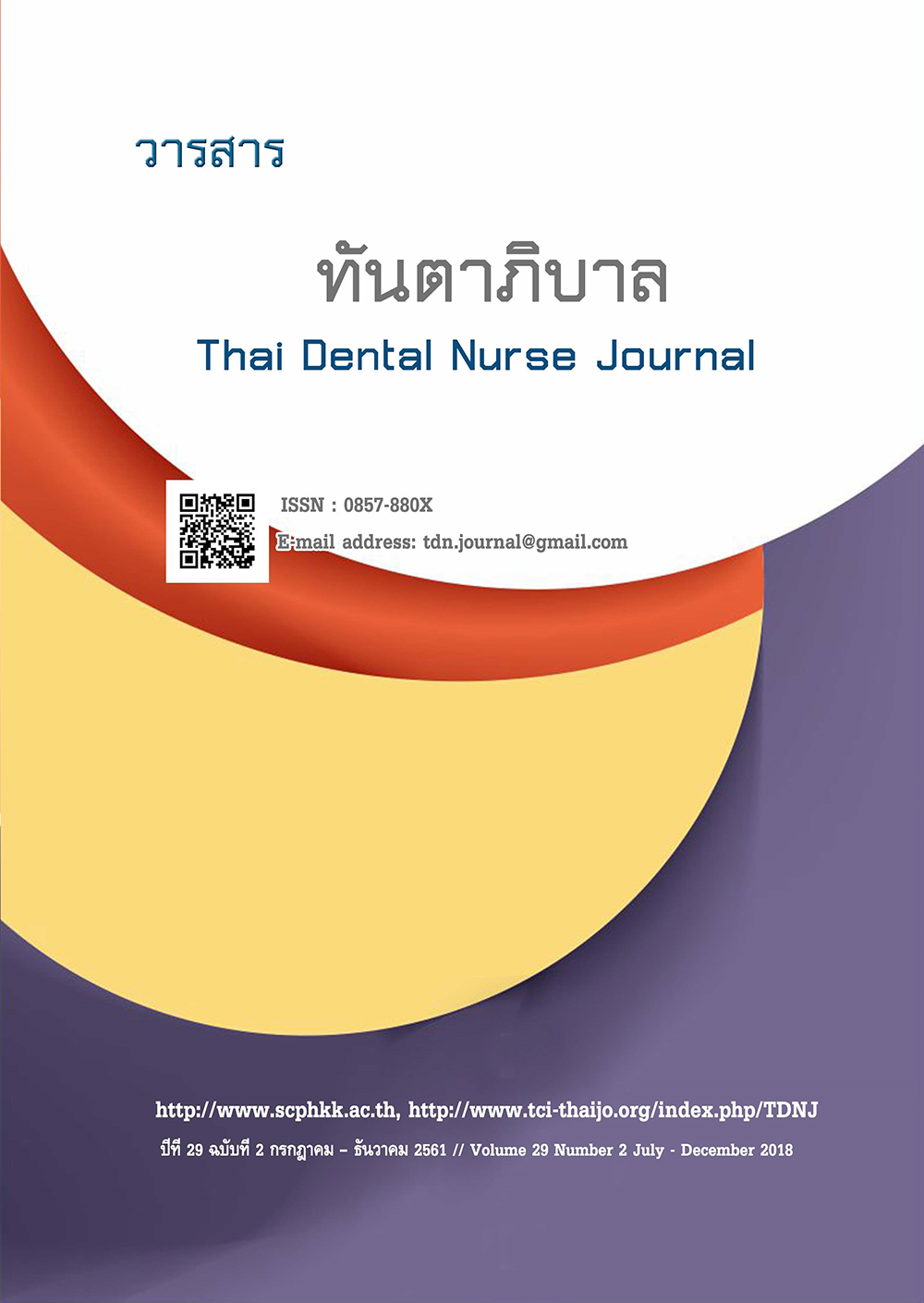Effects of internet use within family relationships among secondary school students in Mueang, Maha Sarakham, Maha Sarakham province
Keywords:
health behaviour; internet, family relationships; high school students, ้health behaviour, internet, family relationships, high school studentAbstract
Internet use is a topic that has received a lot of attention today, in both positive and negative ways. The internet has played an increasingly important role in the lives of people. This study investigated the factors affecting internet usage in the family relationships of secondary school students in Muang district, Maha Sarakham province. A cross sectional study was used to collect 230 samples from students between August to December 2017 with the questionnaire (Cronbach's coefficients 0.89). Data were analyzed with Descriptive Statistics, Chi-square, Pearson's Product Moment Correlation Coefficient, and Factor analysis with Multiple Regression. The results revealed that 57.8% were male , 67.8% were aged between 13-14 years, , 34.8% were in primary school , 70.4% lived with their parents, 85.7% used the internet at home , 73.5% spent most of their free time on the Internet and 73.5% of the students themselves had an influence on internet usage. The average use of the internet was about 3-7 hours a day (37.0 %) and about 8-12 hours a day (21.3%). The students had a moderate level of knowledge, behaviors, practice and the impact of internet use accounted for 49.1%, 63.8%, 60.9% and 86.1% respectively. The correlation between knowledge, behaviors, and the effect of internet usage was statistically significant at 0.05 (p-value = 0.003, 0.009 and 0.001 respectively). Factors that predicted family relationships of students were: 1) internet use for entertainment 2) students themselves had an influence on internet use decisions and 3) practical use of the internet. Therefore, stakeholders should cultivate a value-based framework and practice the right and proper use of the Internet to educate students about the advantages and disadvantages of using the Internet that may affect the health and well-being of students.
References
2.สำนักงานสถิติแห่งชาติ. สำรวจการมีการใช้เทคโนโลยีสารสนเทศและการสื่อสารพ.ศ. 2555. ปีที่พิมพ์, 2556.
3.บุหงา ชัยสุวรรณ และพรพรรณ ประจักษ์เนตร. พฤติกรรมการใช้สื่อใหม่ของวัยรุ่นอายุระหว่าง10-19 ปี.วารสารการสื่อสารและการจัดการ. 2559.
4.สำนักงานสถิติแห่งชาติ. ตารางข้อมูลสถิติจากการสำมะโน/สำรวจ/รายงานสถิติจังหวัด/สำรวจพิเศษ พ.ศ. 2560.ปีที่พิมพ์, 2560.
5.อรุณ จิรวัฒน์กุล.ชีวสถิติ.2553.
6.ศิริวรรณ เสรีรัตน์ และคณะ. องค์การและการจัดการ.กรุงเทพมหานคร : บริษัทวิสิทธิ์พัฒนาจำกัด. 2541.
7.จิราพร ชมพิกุล และคณะ. สัมพันธภาพในครอบครัวไทย.สถาบันพัฒนาการสาธารณสุขอาเซียนมหาวิทยาลัยมหิดล. ห้างหุ้นส่วนจำกัดแท่นทองชินวัฒน์การพิมพ์. 2552.
8.นิภาวัลย์ สมบัติมี. ความสัมพันธ์ของปัจจัยความรู้ ทัศนคติ และการปฏิบัติตนเกี่ยวกับผลกระทบของอินเทอร์เน็ตต่อสุขภาพ ของนิสิตกลุ่มสาขาวิทยาศาสตร์สุขภาพ มหาวิทยาลัยมหาสารคาม.2557.
9.สมชาย วรกิจเกษมสกุล.ระเบียบวิธีการวิจัยทางพฤติกรรมศาสตร์และสังคมศาสตร์. 2553.
10.Thongkambunjong, W., ChooChom, O., Intasuwan, P., &Supparerkchaisakul, N. (2011). Causal factors and effect of internet dependency behavior of high school students in Bangkok Metropolis. Journal of Behavioral Science Vol, 17(2).
11. Kim, J., LaRose, R., &Peng, W. (2009). Loneliness as the cause and the effect of problematic Internet use: The relationship between Internet use and psychological well-being. CyberPsychology&Behavior, 12(4), 451-455.
12. Niruwan Turnbull. (2018), Karl Peltzer, SupaPengpid, Wah Yun Low, Thang Nguyen Huu, Erna Rochmawati, HlaHla Win9. (2018) Pathological Internet Use and Psychosocial Risk Factors among ASEAN University Students. Iranian Journal of Psychiatry and Behavioral Sciences, Vol.12, Issuse 4.
13. Nowland, R., Necka, E. A., &Cacioppo, J. T. (2017). Loneliness and Social Internet Use: Pathways to Reconnection in a Digital World?. Perspectives on Psychological Science, 1745691617713052.
14. ฐิติภัทรประสิทธิ์พร. กินกอดกล่อมเกลาและห้องสมุดบ้าน. [ออนไลน]์ . (เข้าถึงได้เมื่อวันที่ 21 สิงหาคม 2560). เข้าถึงได้จากhttps://gotoknow.org/blog/thitipa-prasitporn.
Downloads
Published
Issue
Section
License
บทความที่ได้รับการตีพิมพ์ถือเป็นลิขสิทธิ์ของวารสารทันตาภิบาล





